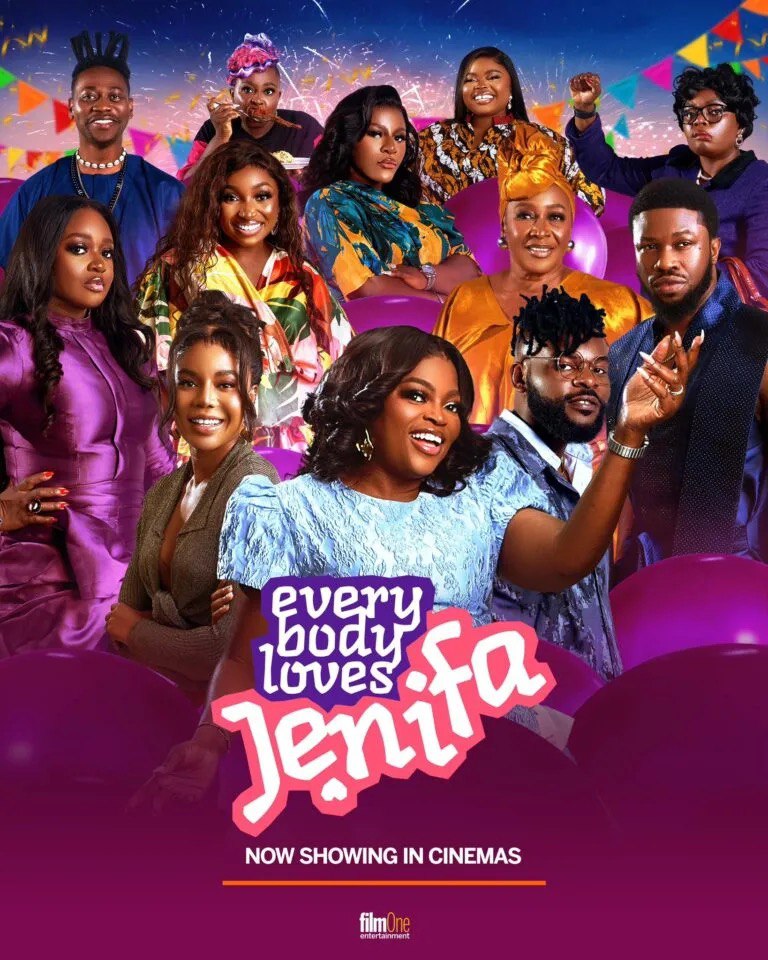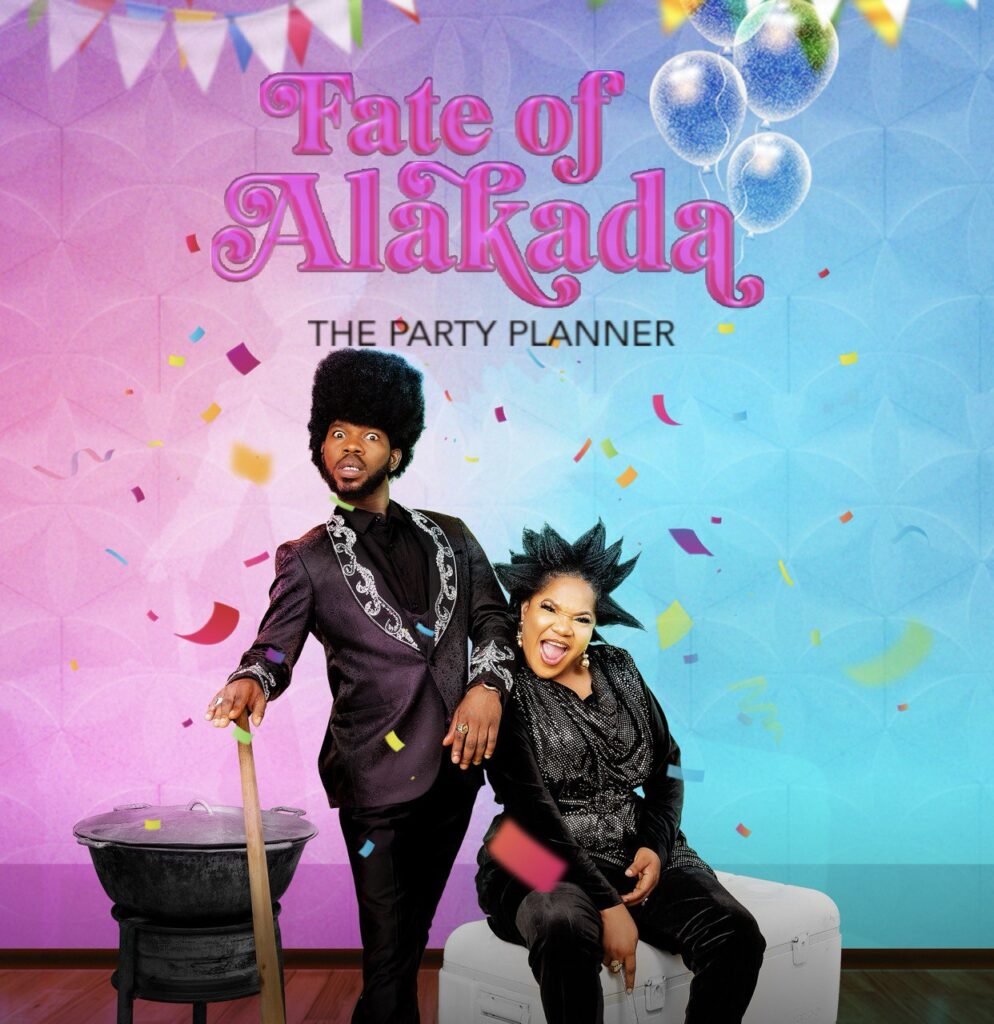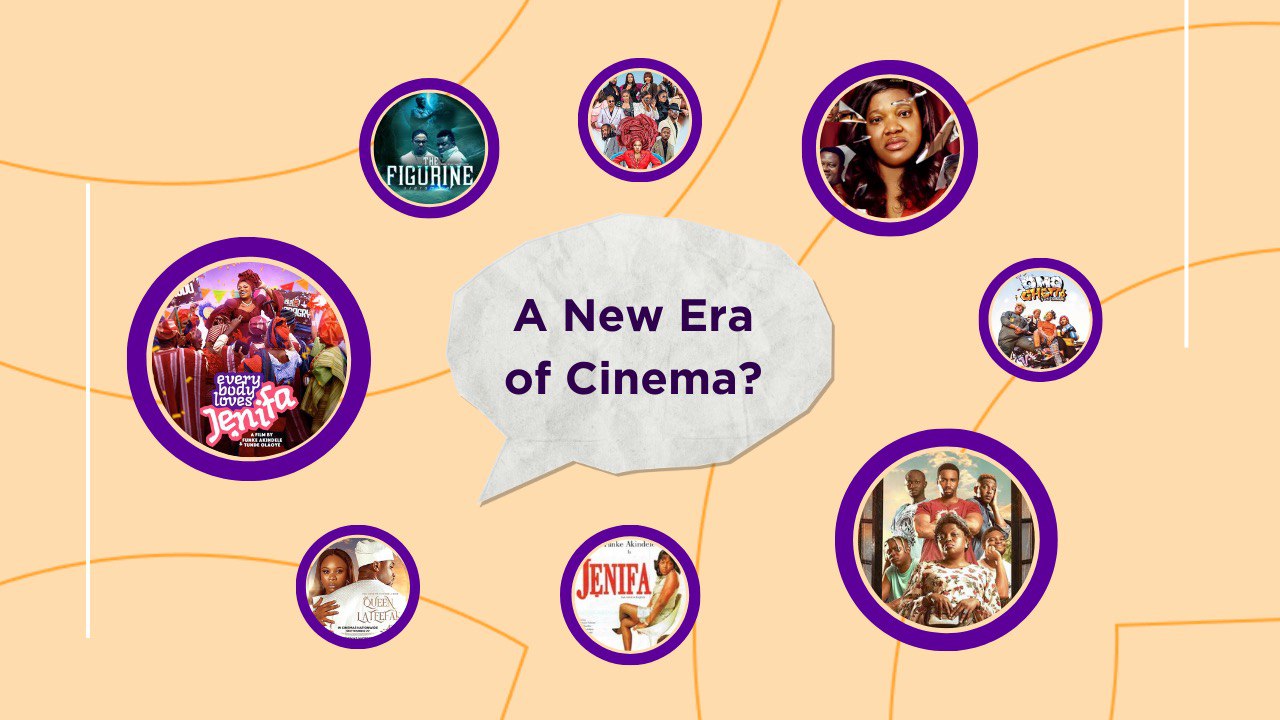The dimly lit cinema fills with the familiar sound of chewing popcorn. Yet, something less familiar mingles in the room: gasps, then a loud applause, as credits roll on Everybody Loves Jenifa. A decade ago, this same cinema hall in Lagos might have been half-empty, showing the latest Hollywood blockbuster. Today, it’s brimming with Nigerians eager to see their own stories and stars take the big screen. Much like how Kunle Afolayan’s The Figurine marked a cultural shift in 2009, Funke Akindele and Toyin Abraham redefined our cinema culture in 2024.
Over the past years, their films have consistently clashed at the box office, culminating in remarkable success last year. Akindele and Abraham’s rivalry began in 2020 on a modest note. Abraham released Fate of Alakada (the fourth installment of her series) shortly after pandemic lockdown eased, becoming the year’s highest-grossing film. That December, Akindele countered with Omo Ghetto: The Saga, setting the stage for her signature hit-release window. While Fate of Alakada held the 2020 crown, Omo Ghetto ultimately won the battle, dethroning The Wedding Party as the highest-grossing Nollywood film ever.
By December 2022, both filmmakers were dominating the box office: Akindele’s Battle on Buka Street, a comedy about two half-sisters with a lifelong rivalry, grossed more than half a million naira, surpassing her own record set by Omo Ghetto: The Saga. Meanwhile, Abraham’s Ijakumo: The Born Again Stripper achieved an impressive 250 million naira. Their success continued in December 2023, with Akindele’s A Tribe Called Judah becoming the first Nollywood film to hit a billion naira at the box office. Abraham’s Malaika also performed strongly, earning over 100 million naira in its first eight days and cementing its place among Nigeria’s highest-grossing films with a record figure for Abraham at the end of its run. Last year, Akindele championed Everybody Loves Jenifa, while Abraham pushed Alakada: Bad and Boujee, two franchises that have solidified their place as the greatest in the brief history since Nigerian cinema revival.

Akindele’s journey with Jenifa began unassumingly. Known for her role as Bisi in the late ’90s sitcom I Need to Know, many thought her career had peaked after her 2009 Africa Movie Academy Award win for Jenifa. However, The Return of Jenifa (2011) and the subsequent TV series Jenifa’s Diary (2015) have proven otherwise. Similarly, Abraham launched Alakada in 2009. Like Jenifa, it was a comedic take on societal themes, particularly the “fake life” culture. At the time, exaggerated “tush” English mixed with pidgin was a trend, with artists like Falz amplifying the humour in flawed grammar.
For fans like Yinka, a 19-year-old student, the appeal of these franchises lies in their authenticity: “I just like the realness, humour, and lessons in the movies. I watched both as a child when they were released and later stuck with Jenifa.”
The appeal of Alakada is harder to pin down, but Abraham clearly taps into something special. Perhaps it’s the lighthearted humour.
Mary, 29, from Lagos, says, “I used to watch Alakada when I was bored. It made me laugh and just grew on me.”
Others, like Peace, a 33-year-old businesswoman, appreciate the balance between humour and moral lessons: “Jenifa is so funny and loves helping people. There’s drama, but the film teaches values. Watching it, you see it’s more than comedy, it carries important messages.”

This enduring audience connection persists despite Nollywood’s obvious storytelling problems. The industry has struggled to balance serious plots with comedic delivery, often prioritizing popularity over talent or using glossy visuals to mask weak scripts. Yet, Jenifa and Alakada thrive despite recycled plots and familiar faces. Why? The answer lies in a mix of strategy, star power, and relatable stories. Despite flawed and predictable storytelling, their superpower lies in creating comic stories rooted in universally relatable themes like family, ambition, and rivalry.
The success of both franchises also owes much to their creators’ marketing innovation. From viral TikTok and Instagram videos to engaging directly with fans on social media, they generate buzz long before their films hit cinemas. Akindele, in particular, has mastered the art of cultural touchpoints, creating seasonal anthems like “Everybody Loves Christmas” and reaching the diaspora market. Her visibility has been further amplified by notable incidents (as observed by an industry commentator): a COVID-19 party controversy with the Lagos government, which many saw as scapegoating, and her short political campaign that garnered significant media attention.

Unlike Hollywood’s iconic franchises like Star Wars, The Lord of the Rings, Rocky/Creed or the many superhero films, Nollywood has yet to fully embrace expansive cinematic universes. Early attempts were largely released during the era of direct-to-home video formats like VHS and DVDs rather than in cinemas. Some of these productions, particularly from the Tade Ogidan era, arguably, even showcased better storytelling. Recent efforts, like Merry Men, The Wedding Party, and AY Makun‘s Akpos franchise, show promise but haven’t fully developed into lasting franchise narratives. However, the success of Everybody Loves Jenifa, albeit a popcorn film, demonstrates the power of sequels in sustaining audience engagement. With stronger storytelling and intentional world-building, Jenifa and Alakada could inspire more sophisticated multi-part narratives with engaging cliffhangers and character arcs.
Some may argue that sequels risk stifling creativity in an industry that is still finding its footing. While it’s true that fresh stories are vital, sequels rejuvenate cinemas by bringing beloved characters back to the screen. The challenge lies in avoiding overreliance, as franchises stretched too thin often lose their spark (Part 20, anyone?).
At present, sequels like Jenifa and Alakada are proving their worth. Abraham’s Alakada (90,000+) has sold more tickets than her previous outing (Malaika- 86,300), while Funke Akindele’s Jenifa (333,606) is already on a record-breaking run despite fewer tickets sold so far than A Tribe Called Judah (375,965). Moreover, their financial success has enabled investments in better filmmaking equipment and possibly improved salaries for cast and crew. Akindele’s evolution as a filmmaker reflects this trend. Each film installment (from Omo Ghetto to BoBS to ATCJ) showcases greater technical sophistication. For Nollywood’s cinema attendance to evolve, it should embrace franchise-building through well-told sequels, prequels, and expanded universes.

The return of these Nigerian franchises represents more than just solo box office success. Their achievements have inspired other filmmakers, such as Eniola Ajao’s Ajakaju and Wumi Toriola’s Queen Lateefah, both of who adopted similar marketing strategies. 2024 cinema newcomer Wumi Toriola, in social media interactions, has alluded to Akindele’s success for her leap from YouTube to theaters. This underscores the ripple effect that Akindele and Abraham have created. They are revitalizing Nigeria’s cinema culture by drawing audiences back to theaters and inspiring their peers, regardless of how the quality of their films is judged.
Nigerian cinema keeps evolving, with these franchises paving the way for future innovations. More people are flocking to theaters to watch a wider variety of films, encouraged by word-of-mouth recommendations and a growing sense of cinematic pride. The success of Akindele and Abraham has created a blueprint that’s already inspiring the next generation of filmmakers. As established directors observe this franchise-driven success, we might see other filmmakers like Kemi Adetiba and Kunle Afolayan crafting their own seasonal box-office hits. Regardless of who dominates the box office, a new era of cinema culture can be built upon, and the world is ready to watch (and judge) this evolution.
Become a patron: To support our in-depth and critical coverage—become a Patron today!
Join the conversation: Share your thoughts in the comments section or on our social media accounts.
Track Upcoming Films: Keep track of upcoming films and TV shows on your Google calendar.





